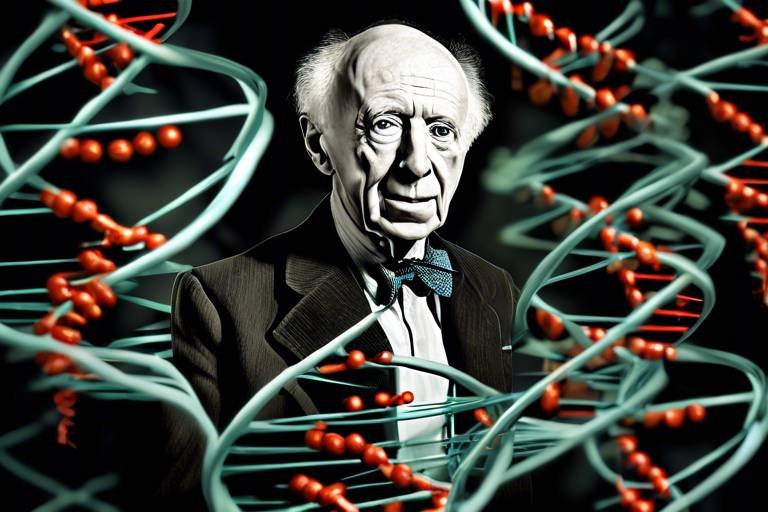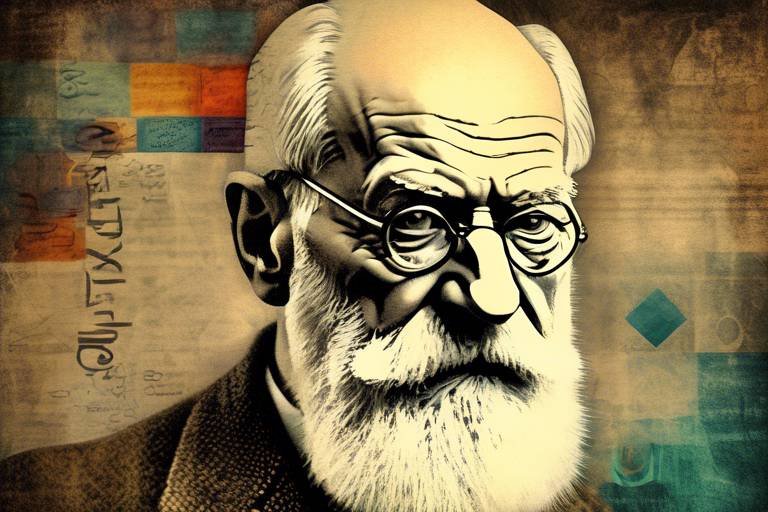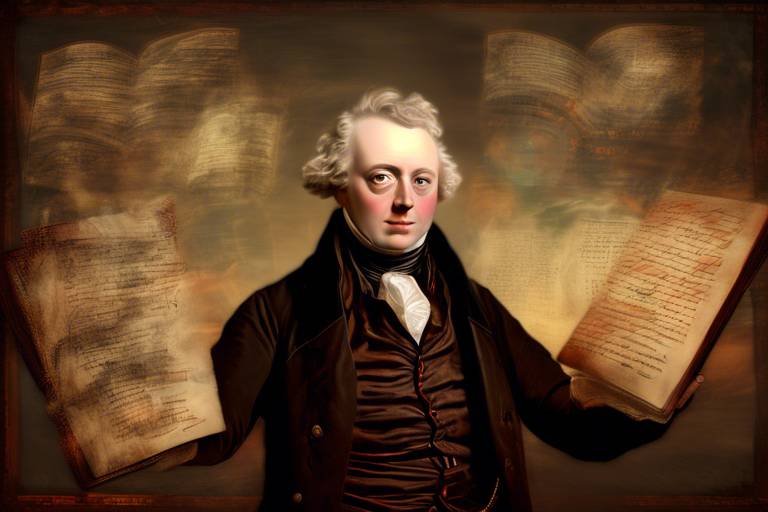The Work of John Locke and Empiricism in Science
This article explores John Locke's contributions to philosophy and science, particularly his role in the development of empiricism, which emphasizes knowledge through sensory experience and observation. Locke, a 17th-century philosopher, challenged the prevailing notions of his time, paving the way for a new understanding of how we acquire knowledge. His ideas not only shaped philosophical discourse but also laid the groundwork for modern scientific inquiry.
John Locke's philosophical ideas laid the groundwork for empiricism, challenging rationalist viewpoints and emphasizing the importance of experience in forming knowledge. Unlike his rationalist contemporaries, who believed in innate ideas, Locke argued that experience is the cornerstone of understanding the world around us. This approach significantly influenced modern scientific methods, as it encouraged thinkers to rely on observation and experimentation rather than mere speculation.
Locke's theory of the mind as a 'tabula rasa' or blank slate posits that individuals are born without innate ideas. This groundbreaking concept revolutionized the understanding of human knowledge acquisition through experience. Imagine starting with a clean slate, where every experience, every sensation, and every interaction adds to your understanding of the world. This idea not only transformed philosophy but also had profound implications for education and personal development.
Locke's tabula rasa concept has profound implications for education, suggesting that learning should be tailored to individual experiences. This approach fosters critical thinking and encourages the exploration of knowledge. In a classroom setting, this means that students are not just passive recipients of information; instead, they engage actively with material, drawing connections between their experiences and the concepts being taught. This method of learning can lead to a more meaningful educational experience.
Locke advocated for experiential learning, where knowledge is gained through direct experience. This method remains foundational in contemporary educational practices, promoting active engagement and practical application of concepts. For instance, instead of merely reading about scientific principles, students might conduct experiments, allowing them to see firsthand the results of their hypotheses. Such hands-on experiences reinforce learning and make it more memorable.
The idea of tabula rasa also emphasizes the role of environment and experiences in personal development, highlighting the importance of nurturing and education in shaping character and intellect. Just as a gardener cultivates a plant, so too do our experiences nurture our minds. The people we interact with, the challenges we face, and the knowledge we acquire all contribute to who we become. This perspective encourages a growth mindset, where individuals believe they can develop their abilities through dedication and hard work.
Locke's empiricism significantly influenced the scientific method, advocating for observation and experimentation as essential components of acquiring knowledge. This shift towards empirical evidence reshaped scientific inquiry, moving it away from philosophical speculation and towards a more structured approach. Scientists began to rely on data and observations, leading to advancements in various fields. The emphasis on evidence-based research has become a hallmark of modern science, allowing for discoveries that were once unimaginable.
Locke's work served as a critique of rationalist thinkers like Descartes, who emphasized innate ideas. Locke argued that knowledge originates from sensory experiences, thus challenging the validity of rationalist claims. This debate between rationalism and empiricism has been pivotal in the history of philosophy, shaping discussions about the nature of knowledge and how we come to understand reality.
Locke's ideas remain relevant in contemporary philosophy, particularly in discussions about knowledge, perception, and the nature of reality. His influence extends to various fields, including psychology and cognitive science, where the understanding of how we learn and process information continues to evolve. Locke's emphasis on experience as the foundation of knowledge has encouraged ongoing exploration and debate in these disciplines.
Locke's emphasis on empiricism laid the groundwork for the scientific inquiry that prioritizes observation and evidence, shaping the methodologies of modern science and fostering advancements across disciplines. By advocating for a systematic approach to understanding the world, Locke helped to establish the principles that guide scientific research today. His legacy is evident in the rigorous methods employed by scientists, who continue to build on his foundational ideas.
- What is empiricism? Empiricism is a philosophical theory that asserts that knowledge comes primarily from sensory experience.
- How did John Locke influence education? Locke's concept of tabula rasa suggests that individuals learn through experiences, emphasizing the importance of tailored educational approaches.
- What is the significance of the scientific method? The scientific method is a systematic way of learning about the world through observation, experimentation, and evidence, heavily influenced by Locke's ideas.
- How does Locke's philosophy relate to modern science? Locke's emphasis on empirical evidence laid the foundation for scientific inquiry, shaping the methodologies used in contemporary research.

Locke's Philosophical Foundations
John Locke's philosophical ideas are nothing short of revolutionary, serving as a beacon that illuminated the path for empiricism. In a world where rationalism reigned supreme, Locke stepped onto the stage and boldly challenged the notion that knowledge is innate or pre-existing within us. He argued that our understanding of the world is primarily shaped by our experiences, which is a perspective that has profoundly influenced modern scientific methods. Imagine starting life as a blank canvas, where every experience adds color and depth to your understanding of reality. This metaphorical canvas is what Locke referred to as tabula rasa, or blank slate, which fundamentally changed how we perceive knowledge acquisition.
Locke’s philosophy emphasizes that knowledge is not something we are born with, but rather something we build through our interactions with the world around us. This approach can be likened to a child learning to ride a bike. Initially, they may wobble and fall, but with each attempt, they gain balance and confidence. In essence, Locke was saying that just as the child learns through practice and experience, so too do we learn about the world through our sensory experiences. This idea is a cornerstone of empiricism, which posits that observation and experience are the primary sources of knowledge.
Moreover, Locke's ideas paved the way for a more systematic approach to inquiry. By advocating for observation and experimentation, he laid the groundwork for what we now consider the scientific method. This method is not merely a collection of steps but a philosophy that encourages curiosity and skepticism. It invites us to ask questions, gather evidence, and draw conclusions based on what we observe. In a sense, Locke's philosophy is an invitation to engage with the world actively rather than passively accepting ideas handed down to us. It encourages us to be explorers in the vast landscape of knowledge.
Locke's thoughts on knowledge acquisition also have significant implications for education. He believed that teaching should be tailored to the individual experiences of students, fostering an environment where critical thinking and exploration are encouraged. This approach is akin to a gardener nurturing different plants, understanding that each requires unique care to flourish. In education, this means recognizing that every learner is distinct, with their own set of experiences and perspectives that shape their understanding of the world.
As we delve deeper into Locke's philosophical foundations, it's essential to recognize the lasting impact of his ideas. They not only shaped the landscape of philosophy but also influenced various fields, including psychology, cognitive science, and even political theory. Locke's emphasis on experience and observation has become a fundamental principle that continues to guide our understanding of human behavior, knowledge, and society.
In conclusion, John Locke's philosophical foundations are a testament to the power of experience in shaping our understanding of the world. His challenge to rationalism and his advocacy for empiricism have left an indelible mark on both philosophy and science, encouraging generations to seek knowledge through observation and inquiry. In a world that often values certainty, Locke reminds us that the journey of learning is as important as the destination.

The Concept of Tabula Rasa
John Locke's theory of the mind as a tabula rasa, or blank slate, is one of his most groundbreaking contributions to philosophy. This notion asserts that individuals are born without pre-existing ideas or knowledge, suggesting that all understanding is derived from experience. Imagine a fresh canvas awaiting the artist's brush; similarly, our minds are open to the rich experiences that life offers, shaping our thoughts and beliefs over time. This perspective not only revolutionized the understanding of how knowledge is acquired but also laid the foundation for modern educational practices.
Locke's idea challenges the notion of innate ideas, which was a common belief among rationalist thinkers like Descartes. Instead of being born with a set of ideas or principles, Locke proposed that we gather knowledge through our senses and interactions with the world around us. This shift in thinking emphasizes the importance of experience—a concept that resonates deeply in various fields, including psychology, education, and even science.
To illustrate the impact of the tabula rasa concept, consider the following key points:
- Knowledge Acquisition: Knowledge is built upon sensory experiences, and each individual's unique experiences contribute to their understanding of the world.
- Education Tailoring: Education should be customized to fit the learner's experiences, promoting a more engaging and effective learning environment.
- Personal Development: The environment plays a crucial role in shaping character and intellect, reinforcing the idea that nurture is as significant as nature.
Locke's vision of education is particularly compelling. He believed that learning should not be a one-size-fits-all approach; instead, it should be tailored to each individual's experiences and interests. This idea fosters a sense of critical thinking and encourages students to explore knowledge actively rather than passively receiving information. In essence, Locke’s approach to education is akin to a gardener tending to different plants—each requires specific care and attention to flourish.
Moreover, the tabula rasa concept has profound implications for experiential learning. Locke advocated that knowledge is best acquired through direct, hands-on experiences rather than through rote memorization. This philosophy has significantly influenced contemporary educational practices, where active engagement, practical application, and real-world experiences are prioritized. For instance, think about how we learn to ride a bike; it’s not enough to read about it or watch someone else do it. We must get on the bike, feel the balance, and experience the process ourselves to truly understand.
In terms of personal development, the idea of tabula rasa emphasizes that our environment and experiences are crucial in shaping who we become. It highlights the importance of nurturing, education, and positive influences in our lives. Just as a sculptor chisels away at a block of marble to reveal a masterpiece, our experiences mold us into who we are, demonstrating that we are not merely products of our genetics, but also of our surroundings.
In conclusion, Locke's concept of tabula rasa is not just a philosophical idea; it is a lens through which we can understand the complexities of human knowledge and development. It invites us to consider the significance of our experiences and the environments we inhabit, reinforcing the idea that we are all works in progress, constantly shaped by the world around us.

Impact on Education
John Locke's concept of the tabula rasa, or blank slate, has had a remarkable impact on the field of education. By positing that individuals are born without innate ideas, Locke opened the door to a revolutionary understanding of how knowledge is acquired. This perspective suggests that education should not be a one-size-fits-all approach but rather tailored to the unique experiences of each learner. Imagine walking into a classroom where every student is treated as a distinct canvas, waiting to be painted with the vibrant colors of experience and knowledge!
Locke's ideas encourage educators to foster an environment where critical thinking is not just encouraged but is a fundamental aspect of learning. When students engage with material through their own experiences, they are more likely to retain information and understand concepts deeply. This method of education promotes a culture of inquiry, where students feel empowered to ask questions, explore ideas, and draw their own conclusions. In this way, Locke's philosophy aligns perfectly with modern educational practices that prioritize active learning.
One of the most significant implications of Locke's theory is the emphasis on experiential learning. This approach involves immersing students in real-world scenarios where they can apply theoretical knowledge practically. For instance, instead of simply reading about ecosystems in a textbook, students might engage in hands-on activities like field trips to nature reserves or conducting experiments in a lab. By doing so, they not only learn but also experience the joy of discovery. Here’s how experiential learning can be categorized:
| Type of Experiential Learning | Description |
|---|---|
| Field Trips | Visits to relevant locations to provide real-world context. |
| Hands-On Projects | Engaging in practical tasks that reinforce theoretical knowledge. |
| Group Discussions | Collaborative exploration of ideas fosters deeper understanding. |
Furthermore, Locke's emphasis on the role of the environment in shaping a person's intellect and character cannot be overstated. He believed that experiences, rather than pre-existing ideas, mold individuals into who they become. This insight has profound implications for educators and parents alike. It highlights the importance of creating supportive and enriching environments that nurture curiosity and a love for learning. After all, a garden flourishes best when it is tended to with care and attention.
In conclusion, the impact of John Locke's philosophy on education is both profound and far-reaching. By advocating for a learning process that is rooted in experience, he paved the way for educational methodologies that prioritize student engagement and personal growth. The legacy of his ideas continues to shape classrooms today, fostering environments where students can thrive as independent thinkers and lifelong learners.
- What is the tabula rasa theory?
The tabula rasa theory suggests that individuals are born without innate ideas, and knowledge is acquired through experience and sensory perception.
- How does Locke's philosophy influence modern education?
Locke's philosophy promotes experiential learning, encouraging educators to tailor their teaching methods to individual student experiences and foster critical thinking.
- What are the benefits of experiential learning?
Experiential learning enhances retention, encourages active engagement, and allows students to apply knowledge in real-world contexts.

Experiential Learning
Experiential learning is a core principle that John Locke championed, and it is as relevant today as it was in his time. The essence of this approach lies in the belief that knowledge is best acquired through direct experience. Imagine learning to ride a bike; no amount of reading about balance or pedaling can compare to the actual experience of getting on the bike, feeling the wind, and maybe even taking a few tumbles along the way. This hands-on approach not only enhances understanding but also makes learning more engaging and memorable.
Locke argued that individuals learn most effectively when they can interact with their environment. This philosophy has led to the development of various educational methods that prioritize active participation. For instance, instead of merely listening to lectures, students might engage in projects, experiments, or field trips. These activities not only make learning enjoyable but also allow students to apply theoretical knowledge in real-world contexts.
Moreover, experiential learning fosters critical thinking and problem-solving skills. When students face challenges during their learning experiences, they must analyze situations, make decisions, and reflect on their actions. This process is akin to a scientist conducting an experiment: hypothesizing, testing, and drawing conclusions. As a result, learners become not just passive recipients of information but active participants in their educational journey.
In today’s educational landscape, experiential learning is implemented in various forms, including:
- Internships and Apprenticeships: These provide students with hands-on experience in their chosen fields, bridging the gap between theory and practice.
- Service Learning: This involves community service projects that allow students to apply classroom knowledge to real-world problems, fostering a sense of civic responsibility.
- Project-Based Learning: Students work on projects that require them to investigate and respond to complex questions, encouraging collaboration and creativity.
Ultimately, Locke’s advocacy for experiential learning highlights the significance of environment and experience in the learning process. It reminds us that education is not just about memorizing facts; it’s about engaging with the world around us, asking questions, and seeking answers through exploration. By embracing this approach, we can cultivate a generation of thinkers and doers who are well-equipped to navigate the complexities of life.
Q: What is experiential learning?
A: Experiential learning is an educational approach that emphasizes learning through direct experience and reflection, allowing individuals to engage actively in their learning process.
Q: How does experiential learning differ from traditional learning?
A: Traditional learning often relies on lectures and memorization, while experiential learning encourages hands-on activities, critical thinking, and real-world application of knowledge.
Q: What are some examples of experiential learning?
A: Examples include internships, service learning, project-based learning, and field trips that allow students to engage with their subject matter actively.
Q: Why is experiential learning important?
A: It enhances understanding, promotes retention of knowledge, develops critical thinking skills, and prepares individuals for real-world challenges by encouraging active participation in their learning journey.

Personal Development
The concept of tabula rasa, as proposed by John Locke, emphasizes that individuals are not born with pre-existing ideas or knowledge; rather, they are shaped by their experiences and environment. This revolutionary notion has profound implications for . Imagine a blank canvas, waiting to be filled with colors and shapes. Just like that canvas, our minds are open to the influences of our surroundings, education, and personal experiences. This perspective not only reshapes how we view ourselves but also how we approach growth and learning.
Locke's insights suggest that the journey of personal development begins at birth and continues throughout life, influenced by various factors. Our experiences—be they positive or negative—play a crucial role in molding our character, beliefs, and intellect. For instance, consider how a child's initial interactions with family, friends, and teachers can set the stage for their future attitudes and behaviors. The nurturing they receive, the challenges they face, and the knowledge they acquire all contribute to their personal growth.
Moreover, personal development is not a one-size-fits-all journey. Each individual's path is unique, shaped by their specific experiences. This is where Locke's emphasis on experiential learning becomes vital. By engaging in hands-on activities and reflecting on those experiences, individuals can cultivate critical thinking skills and a deeper understanding of themselves and the world around them. For example, participating in community service can not only enhance empathy but also provide practical skills that aid in personal and professional development.
To truly harness the power of personal development, it is essential to create an environment that encourages exploration and growth. Here are some key factors that can enhance personal development:
- Supportive Relationships: Surrounding oneself with positive influences can inspire growth and provide guidance.
- Continuous Learning: Embracing new challenges and knowledge fosters adaptability and resilience.
- Self-Reflection: Regularly assessing one's experiences helps identify strengths and areas for improvement.
In summary, Locke's theory of tabula rasa underscores the significance of experience in personal development. By recognizing that we are shaped by our interactions and the knowledge we acquire, we can actively engage in our growth journey. This approach not only promotes a deeper understanding of ourselves but also prepares us to navigate the complexities of life with confidence and purpose.
- What is the concept of tabula rasa?
Tabula rasa is the idea that individuals are born as a blank slate, without innate ideas, and that knowledge is acquired through experience.
- How does Locke's philosophy influence education?
Locke's philosophy suggests that education should be tailored to individual experiences, fostering critical thinking and exploration.
- What role does environment play in personal development?
The environment significantly shapes an individual's experiences, which in turn influences their character and intellect.

Influence on Scientific Method
John Locke's contributions to the scientific method cannot be overstated. His emphasis on empirical observation and experimentation laid a solid foundation for modern scientific inquiry. Before Locke, many philosophers, especially rationalists like Descartes, believed that knowledge could be derived from innate ideas and reasoning alone. However, Locke turned this notion on its head by asserting that knowledge is primarily acquired through our senses and experiences. This revolutionary perspective encouraged scientists to prioritize evidence-based approaches, leading to a profound transformation in how research was conducted.
Locke's insistence on the importance of observational evidence meant that scientists began to shift away from purely theoretical frameworks. Instead, they started to rely on systematic observation and experimentation to test their hypotheses. This change is significant because it helped establish a rigorous methodology that is still in use today. For instance, the scientific method now typically involves the following steps:
| Step | Description |
|---|---|
| Observation | Identify a phenomenon or problem to study. |
| Hypothesis | Formulate a testable explanation based on observations. |
| Experimentation | Conduct experiments to test the hypothesis. |
| Analysis | Analyze the data collected during experiments. |
| Conclusion | Draw conclusions based on the analysis and repeat if necessary. |
Through this structured approach, Locke’s influence became evident as scientists began to realize that relying on sensory experiences could lead to more reliable and valid conclusions. For example, the field of biology evolved dramatically as researchers started to observe organisms in their natural habitats rather than relying solely on philosophical speculation about their nature. This shift not only enhanced understanding but also paved the way for groundbreaking discoveries.
Moreover, Locke's emphasis on experimentation fostered a spirit of inquiry and skepticism that is crucial in science. By advocating for the idea that theories must be tested against observable reality, he encouraged scientists to question established norms and seek evidence before accepting any claims. This critical approach has been instrumental in the advancement of various scientific fields, from physics to psychology.
In summary, John Locke's impact on the scientific method is profound and enduring. His advocacy for empiricism fundamentally altered the landscape of scientific inquiry, emphasizing that knowledge must be rooted in experience and evidence. This legacy continues to shape how scientists conduct research, ensuring that the pursuit of knowledge remains grounded in reality.
- What is John Locke known for? Locke is best known for his contributions to empiricism and his theories regarding the mind as a blank slate.
- How did Locke influence the scientific method? Locke emphasized observation and experimentation, encouraging a shift away from rationalism and towards evidence-based approaches.
- What is the theory of tabula rasa? The theory of tabula rasa suggests that individuals are born without innate ideas, and knowledge is acquired through experience.
- Why is empiricism important in science? Empiricism is crucial in science because it promotes the use of observable evidence and experimentation to form conclusions, leading to more reliable knowledge.

Critiques of Rationalism
John Locke's philosophical contributions were not just revolutionary; they were also deeply critical of the prevailing rationalist views of his time. Rationalism, championed by thinkers like René Descartes, posited that knowledge could be derived from reason alone, often relying on innate ideas that existed prior to experience. Locke took a bold stand against this notion, arguing that all knowledge originates from sensory experience. This perspective was not merely a philosophical stance; it was a fundamental shift in how one could understand the acquisition of knowledge.
Locke's critique of rationalism can be understood through several key arguments:
- Innate Ideas: Locke rejected the idea that humans are born with pre-existing knowledge. He believed that the mind at birth is a tabula rasa, or blank slate, which is filled through experiences and perceptions.
- Empirical Evidence: He emphasized that knowledge must be grounded in empirical evidence, which can only be obtained through observation and experience. This was a direct challenge to the rationalist reliance on abstract reasoning.
- Limits of Reason: Locke argued that reason itself is limited and can lead to errors if not checked by experience. He believed that relying solely on reason could result in false conclusions, especially in matters of the natural world.
Locke's arguments were not just theoretical; they had practical implications. By emphasizing the role of experience, he paved the way for a more scientific approach to understanding the world. This shift meant that rather than relying on deduction from assumed truths, thinkers and scientists would need to engage with the world directly, collecting data and making observations.
Moreover, Locke's critiques of rationalism also opened the door for future philosophers and scientists to explore the realms of psychology and cognitive science. His insistence on the importance of sensory experience influenced later thinkers like David Hume, who further developed empiricist ideas. In a way, Locke's work can be seen as the catalyst that ignited a movement towards a more observational and experimental approach to knowledge, which is the hallmark of modern science.
In conclusion, Locke's critiques of rationalism were not merely dismissive; they were constructive and aimed at refining the understanding of knowledge itself. By advocating for a reliance on experience, he challenged the intellectual community to rethink their assumptions and embrace a more grounded approach to inquiry. This legacy continues to resonate in contemporary discussions about knowledge and reality, proving that Locke's insights were not just relevant to his time but remain vital to our understanding of the world today.
- What is empiricism? Empiricism is the philosophical stance that knowledge comes primarily from sensory experience and observation.
- How did Locke challenge rationalism? Locke argued against the existence of innate ideas and emphasized that knowledge is acquired through experience.
- What is the significance of the tabula rasa concept? The tabula rasa concept suggests that individuals are born without preconceived notions, and their knowledge is shaped by experiences.
- Who were some philosophers influenced by Locke? Philosophers like David Hume and later empiricists were significantly influenced by Locke's ideas on knowledge and experience.

Legacy in Modern Philosophy
John Locke's influence on modern philosophy is nothing short of monumental. His ideas continue to resonate in contemporary discussions about knowledge, perception, and reality. By challenging the rationalist perspective, Locke paved the way for a more empirical approach to understanding the world. This shift is not merely academic; it has practical implications that extend into various fields, including psychology, cognitive science, and even political theory. The essence of Locke's philosophy can be distilled into a few key themes that remain relevant today.
One of the most significant legacies of Locke is his emphasis on empiricism. This principle asserts that knowledge arises from sensory experience, a notion that has become foundational in both philosophy and science. In a world increasingly driven by data and evidence, Locke's insistence on observation as a means to acquire knowledge is more pertinent than ever. For instance, modern scientific methods heavily rely on empirical data collected through experiments and observations, echoing Locke's ideas.
Moreover, Locke's theories have profound implications for our understanding of human nature. His belief in the tabula rasa, or blank slate, posits that individuals are shaped by their experiences rather than predetermined by innate ideas. This perspective has influenced contemporary debates in psychology, particularly in areas such as developmental psychology and behavioral studies. The idea that our environment and experiences mold our identities challenges deterministic views and opens up discussions about free will and personal responsibility.
Locke's work also laid the groundwork for discussions around political philosophy. His thoughts on individual rights, government by consent, and the social contract have significantly impacted modern democratic theory. The principles he championed continue to inform contemporary political discourse, emphasizing the importance of individual liberty and the role of government in protecting these rights. Locke's legacy is evident in the foundations of democratic societies, where the protection of personal freedoms remains a central tenet.
In summary, John Locke's contributions to modern philosophy are vast and multifaceted. His advocacy for empiricism, exploration of human nature, and insights into political theory have left an indelible mark on how we understand knowledge and society today. As we navigate an increasingly complex world, Locke's ideas serve as a reminder of the importance of experience, observation, and critical thinking in shaping our understanding of both ourselves and the world around us.
- What is empiricism? Empiricism is a philosophical theory that asserts that knowledge comes primarily from sensory experience.
- How did Locke influence modern science? Locke's emphasis on observation and experimentation laid the groundwork for the scientific method, which prioritizes empirical evidence in research.
- What is the significance of the tabula rasa concept? The tabula rasa concept suggests that individuals are born without innate ideas, and their knowledge is shaped entirely by their experiences.
- How does Locke's philosophy relate to education? Locke's ideas promote experiential learning, advocating that education should be tailored to individual experiences to foster critical thinking.

Relation to Scientific Inquiry
John Locke's emphasis on empiricism has profoundly influenced the landscape of scientific inquiry. By asserting that knowledge should be derived from sensory experiences, Locke laid the groundwork for a methodology that prioritizes observation and experimentation. Imagine trying to build a house without a solid foundation; similarly, scientific progress relies heavily on the principles Locke championed. His insistence on the importance of evidence gathered through the senses reshaped how scientists approach their work, leading to a more systematic and rigorous exploration of the natural world.
Locke's ideas led to the recognition that theories must be tested against reality, a concept that has become a cornerstone of modern science. This shift meant that rather than relying solely on abstract reasoning or innate ideas, scientists began to observe phenomena, conduct experiments, and gather data to support their hypotheses. For instance, consider how the scientific method has evolved into a structured process that includes:
- Observation: Noticing a phenomenon and asking questions.
- Hypothesis: Formulating a testable statement based on observations.
- Experimentation: Conducting experiments to test the hypothesis.
- Analysis: Evaluating the data collected to draw conclusions.
- Conclusion: Determining whether the hypothesis is supported or refuted.
This methodical approach has not only advanced the fields of physics, biology, and chemistry, but has also permeated disciplines such as psychology and social sciences. For example, in psychology, researchers often use observational studies and experiments to understand human behavior, echoing Locke's belief in the significance of experience as a source of knowledge.
Moreover, Locke's rejection of innate ideas in favor of learned knowledge has implications for how we view scientific advancement. Each generation builds on the discoveries of the previous ones, creating a rich tapestry of knowledge that is continuously evolving. This can be likened to a relay race, where each runner passes the baton to the next, ensuring that progress is made through collective experience and understanding.
In today's world, where information is abundant and easily accessible, Locke's principles remain relevant. Scientists and researchers are constantly encouraged to question existing knowledge, seek empirical evidence, and remain open to new ideas. This dynamic interplay between observation and theory fosters an environment where innovation can thrive, leading to breakthroughs that change our understanding of the universe.
- What is empiricism?
Empiricism is the philosophical stance that knowledge is primarily gained through sensory experience and observation. - How did John Locke influence modern science?
Locke's emphasis on observation and experimentation helped shape the scientific method, leading to more rigorous and systematic approaches in scientific inquiry. - What is the significance of the tabula rasa concept?
The tabula rasa concept suggests that individuals are born without innate ideas, emphasizing the role of experience in knowledge acquisition. - How does Locke's philosophy relate to education?
Locke's ideas encourage educational approaches that are tailored to individual experiences, fostering critical thinking and personal development.
Frequently Asked Questions
- What is John Locke's contribution to empiricism?
John Locke is often regarded as a pivotal figure in the development of empiricism. He argued that knowledge comes primarily from sensory experience and observation, challenging the rationalist belief in innate ideas. His work laid the foundation for modern scientific methods by emphasizing the importance of evidence and experimentation.
- What does the term 'tabula rasa' mean?
'Tabula rasa' is a Latin phrase meaning 'blank slate.' Locke proposed that individuals are born without any preconceived ideas or knowledge. Instead, he believed that all knowledge is acquired through experience and interaction with the world, which fundamentally changed how we understand learning and knowledge acquisition.
- How does Locke's philosophy impact education?
Locke's concept of 'tabula rasa' has significant implications for education. It suggests that teaching should be customized to fit individual experiences and needs, promoting critical thinking and exploration. By fostering an environment where students learn through direct experience, educators can enhance engagement and understanding.
- What is experiential learning according to Locke?
Experiential learning, as advocated by Locke, is the process of gaining knowledge through direct experience. This approach emphasizes active participation, allowing learners to apply concepts in real-world situations. It remains a cornerstone of modern educational practices, encouraging deeper understanding and retention of information.
- How did Locke critique rationalism?
Locke critiqued rationalist thinkers like Descartes by arguing against the existence of innate ideas. He posited that knowledge originates from sensory experiences rather than being pre-existing in the mind. This challenge to rationalism helped to shift philosophical discourse towards a more empirical approach to knowledge.
- What is Locke's legacy in modern philosophy?
Locke's ideas continue to influence contemporary philosophy, especially in discussions about knowledge, perception, and reality. His work has also impacted fields such as psychology and cognitive science, where the understanding of human cognition and learning processes is crucial.
- How has Locke influenced scientific inquiry?
Locke's emphasis on empiricism has profoundly shaped scientific inquiry by prioritizing observation and evidence. His advocacy for a methodical approach to acquiring knowledge laid the groundwork for advancements in various scientific disciplines, fostering a culture of inquiry based on empirical data.



















